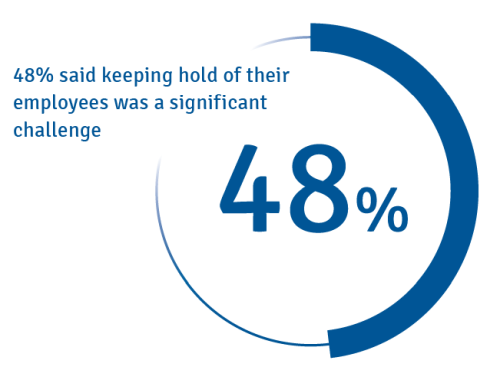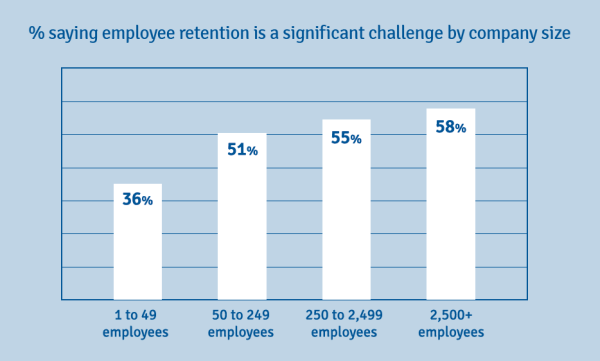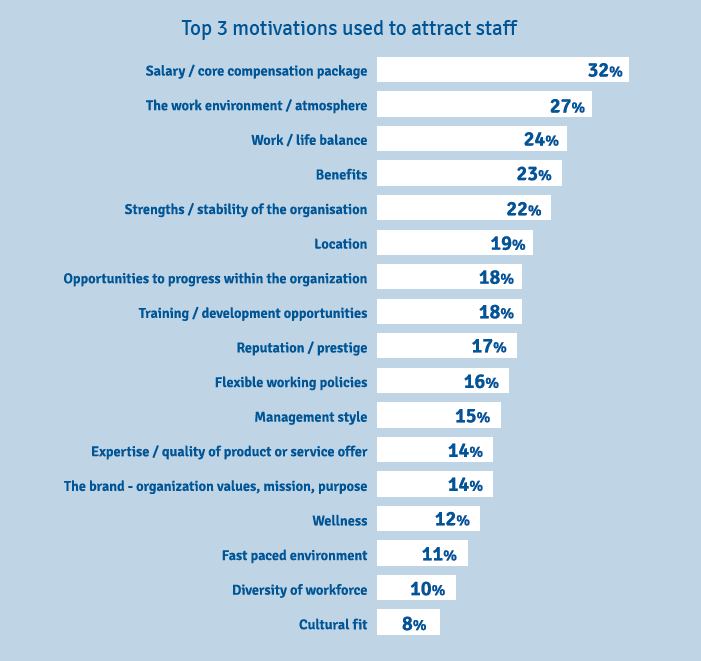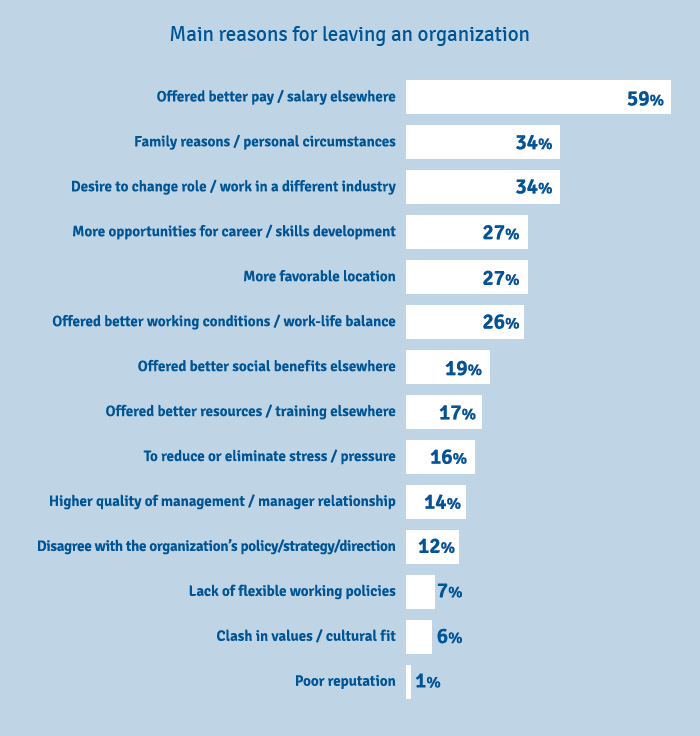Introduction
Around the world millions of organizations live by the mantra that happy employees make happy customers. The research we have done for our clients over the years has proven this to be the case; there is indeed a strong correlation between employee satisfaction and customer satisfaction.
Therefore, it comes as no surprise that organizations are putting more and more focus on making their employees happy through changes to working hours or patterns, upgrading of the equipment used and by putting more emphasis on mental health and wellbeing. All these actions are certainly helping engage the workforce in the short-term but in the long-term they will have a limited impact on the engagement of your employees if you have adapted the wrong recruitment strategy in the first place.
The recruitment strategy employers are taking is becoming more important and will continue to be so in years to come. The full impact that Covid-19 and the new normal will have on employees is yet to be seen, but one thing for sure is that things will never be the same again. The recruitment and onboarding of employees process will continue to be adapted during this time and organizations will need to work harder in order to engage their employees.
Adapting the right recruitment strategy can make or break the engagement of your employees. To clarify the importance of getting this right, we have surveyed 945 decision makers in HR, Recruitment and Business Management roles from organizations in Europe, the USA and China.
The objective? We wanted to understand how much of a challenge employee retention was for their organization. What motivations they use to attract people, the main reasons employees leave and ultimately how successful they are in attracting, engaging and retaining their people.
What we found is that over two-thirds of all organizations get it wrong when adopting their recruitment strategy and therefore result in problems around employee retention.
Is employee retention a challenge?
We asked those that we spoke to how much of an issue employee retention was to their organization and 48% said keeping hold of their employees was a significant challenge.
Surprisingly only a fifth said they found it easy to retain their employees.

Further cross-examining of the data established that as an organization increases in size it gets more and more difficult to hold onto staff, this was a consistent picture across all countries in the study.

What motivations do organizations use to attract people?
After learning that employee retention was a significant challenge, we wanted to understand how an organization attract its people.
It was no surprise to hear that organizations concentrate on lots of different factors so to get a more focused view we asked them what their top 3 motivations were and the organizations told us that they are mainly focusing on salaries (32%) and the working environment (27%).
One interesting geographic difference was that salaries were significantly more focused on in China than in any other region (42%).

After further examination of the data, segmentation analysis determined that there were 3 different ways in which organizations are attracting future employees. Organizations either take a Bankroller, Trendsetter or Culturist approach.
More detail on each of these strategies and how much of a challenge employee retention is can be seen below.
| Bankrollers | Trendsetters | Culturists | |
|---|---|---|---|
| % of organizations | 46% | 23% | 31% |
| Attract people… | …through salaries and the prestige of working with the business | …through promoting their product / service quality and expertise | …through the culture of the business and working environment |
| The top motivators to attract staff are |
|
|
|
| Typically found in |
|
|
|
| % saying employee retention is a challenge | 57% | 52% | 33% |
An interesting finding was that Culturists find it significantly less challenging to retain their employees and this is mainly driven by the company’s recruitment motivators. As such focusing on the working environment, the work life balance and having a more progressive management style can have a huge impact on being able to retain your employees.
Why do people leave?
One way to reduce the challenge of employee retention is to determine the reasons why people leave an organization, as self-reflecting on this helps you to learn about the motives of your employees and any shortfalls in the employment you are providing.
When asked, over half of all organizations stated that employees are likely to leave because the salary is better elsewhere. The other main reasons for leaving were down to personal circumstances and a desire to work in a different industry.

When we then examined the reasons for customer churn across different segments, we saw some very interesting differences.
| Bankrollers | Trendsetters | Culturists | |
|---|---|---|---|
| People leave… | …because they are unsatisfied at work, want a better salary and have limited career development | …because they are unsatisfied at work | …because of external and family reasons |
| The top motivators used to attract staff are |
|
|
|
Interestingly a lot of the initial motivators for choosing an employer impact on the reasons for people leaving as well.
-
Bankrollers particularly struggle in keeping hold of employees as the people they have recruited are very much driven by salary and career development.
-
Staff of Trendsetters also leave as a result of salaries and the resources and training available to them elsewhere.
-
Culturists do a much better job in keeping hold of their employees and most only leave as a result of external factors such as family reasons or moving location.
“Bankrollers particularly struggle in keeping hold of employees”
How does an organization best attract, retain and ultimately keep their people engaged?
To best attract, retain and engage employees you should develop your recruitment approach around being a Culturist.
| % agreeing with statement | Bankrollers | Trendsetters | Culturists |
|---|---|---|---|
| …it is becoming more difficult to attract employees | 48% | 42% | 33% |
| …it is becoming more difficult to retain employees | 43% | 39% | 22% |
| …my organization is good at keeping employees | 35% | 36% | 55% |
Benefits of becoming a culturist:
-
Culturists find it easier to attract people and retain staff. Their employees typically
leave for personal external reasons as opposed to internal factors such as pay and general dissatisfaction in the role. -
Culturists are significantly better at keeping employees engaged and in return benefit from higher customer satisfaction levels.
How to become a Culturist:
To become a Culturist, make sure to create a company culture that supports a healthy work-life-balance and an overall nurturing working environment. Train your managing staff to become progressive mentors, who listen and care for their colleagues.
Sure, even Culturist companies need to make sure to offer a competitive salary package and good training opportunities to be considered a decent employer, however, in the long run it pays off to focus on those intangible soft factors. A truly caring company culture is hard to replace and will give you a competitive edge in the fight for the best talent.
Quiz: Is your organization a Bankroller, Trendsetter or Culturist?
In developing the segmentation, B2B International’s in-house statisticians have used numerous different questions as inputs. In order to find out which segment your organization would fall into, the statistics team has created one killer question; the answers to that question will tell you your organization’s most likely segment.
Please complete the exercise below, to find out the type of organization you are most likely to work for.
Question
What do you think particularly attracts people to work for your organization? Please select the top 2 motivations.
a. Salary / core compensation package
b. Work environment / atmosphere
c. Work / life balance
d. Reputation / prestige
e. Expertise / quality of product or service offer
f. Fast paced environment
Answers
If you selected the following two answers you are most likely to work for a Bankroller…
- Salary / core compensation package & Work environment / atmosphere
- Salary / core compensation package & Reputation / prestige
- Reputation / prestige & Expertise / quality of product or service offer
- Reputation / prestige & Fast paced environment
If you selected the following two answers you are most likely to work for a Trendsetter…
- Salary / core compensation package & Expertise / quality of product or service offer
- Salary / core compensation package & Fast paced environment
- Work environment / atmosphere & Reputation / prestige
- Work environment / atmosphere & Fast paced environment
- Work / life balance & Expertise / quality of product or service offer
- Expertise / quality of product or service offer & Fast paced environment
If you selected the following two answers you are most likely to work for a Culturist…
- Salary / core compensation package & Work / life balance
- Work environment / atmosphere & Work / life balance
- Work environment / atmosphere & Expertise / quality of product or service offer
- Work / life balance & Reputation / prestige
- Work / life balance & Fast paced environment
Readers of this article also viewed:



